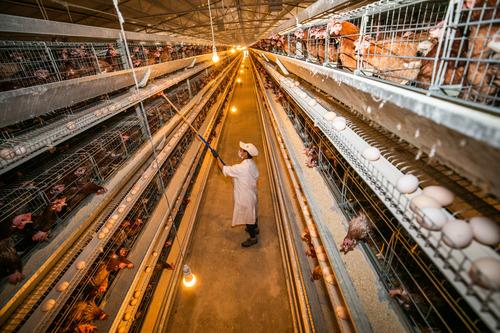XIAMEN, Nov. 19 (Xinhua) -- Whenever Lei Jinrong turns on his phone, he can see hundreds of thousands of chickens roaming here and there on a mountain. Each fowl wears an electronic anklet counting its steps.
Smart anklets, cameras, sensors... These digital technologies are breaking the stereotype of stinky, messy chicken farms and transforming China's chicken-raising industry.
Cooperating with Alibaba Cloud, the cloud computing arm of China's internet giant Alibaba, and Longyan University, Lei, general manager of Fuxin Animal Husbandry Company Limited, has just completed the digital reform of his chicken-raising base in east China's Fujian Province.
The move aimed to improve the base's chicken-raising efficiency and establish a standardized breeding mode through automatic and intelligent equipment.
"All the chickens wear electronic anklets counting their steps to determine whether they are sick. A healthy fowl can walk 12,000 to 18,000 steps a day," said Lin Wei from Alibaba Cloud Intelligent Digital Government Division.
Based on analysis of the birds' step count, egg yields and other data, technicians can devise solutions to improve egg laying and hatching rates.
With cameras and sensors installed in the chicken farm, digital solutions can, among other things, monitor the growth of chickens and their living conditions, finetune room temperature and ventilate henhouses.
In chicken houses with high temperature and humidity, excrement and other substances are more likely to decay, thus generating a large amount of ammonia and other harmful gases.
"The sensors can measure the concentration of ammonia and automatically turn on the exhaust fans," Lin said.
Lei made his "first bucket of gold" of 2 million yuan (about 304,600 U.S. dollars) by breeding pigs decades ago. "As people's incomes have risen, so too has their desire for high-quality food," he said.
Around 12 years ago, he shifted his focus to the chicken-raising industry and imported a chicken breed from Britain. Now his company can sell more than 2 million chickens a year.
Not content with merely seeking his personal fortune, Lei has helped more than 400 poverty-stricken households raise chickens. In the past, he went door to door to assist them with feeding or vaccinating chickens. Now the digital system can do the work for him.
"We hope to determine the relationships between chickens' food and water intake, egg production, illumination, temperature and humidity through data analysis, thus establishing standards for chicken raising," said Wu Qiong, a PhD candidate with Longyan University.
From chicken raising to pig farming and tea production, digital solutions are widely used by a growing number of sectors in China, with traditional industries increasingly going digital.
Despite the impact of COVID-19, Lei has a bigger ambition next year -- to export his chickens and acquire a turnover of 100 million yuan. Enditem




 A single purchase
A single purchase









